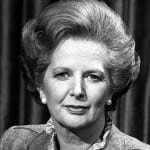
Margaret Thatcher, Britain's first-ever female Prime Minister, who died Monday morning at the age of 87, was a controversial politician whose popularity depended on the perspective. But in the years since she left office, the controversial politician has almost completely given way to the iconic leader whose own “brand,” as the "Iron Lady," came to symbolize something more than a mere politician. While she’s not quite legendary, she transcended politics to become not just politically significant, but culturally significant.
Of course, there are a lot of reasons why this happened, some related to being in the right place at the right time and some related to her message. But it’s a fascinating thing when people (Kennedy, Elvis, Reagan) take on culturally important roles, and it’s not just people—brands too sometimes find that exalted status as culturally meaningful. Again, this is often caused by a variety of things, but messaging and communications of key attributes are usually right in the middle of things.
Google is a recent example of a brand that has become culturally pervasive—it’s more than just another search engine from the days of Lycos, AltaVista, Excite! and others. Google's basic message is strong and easily understood—organization of the world’s information—but its advertising business leads the world and it has become so powerful and its business practices so innovative that it’s hard to envision a world without Google.
Apple is another iconic brand, much more in cultural terms than just another computer or phone product. And although it’s much older than Google, it, too, had a very simple, understandable message: “to make a contribution to the world by making tools for the mind that advance humankind.”
A third transcendent brand is Twitter, a company that realized the growing importance of brevity within online communications. Though Twitter has reconfigured its business to feature more multimedia, image editing and paid placements, it has still stayed true to its 140-character model and has transformed the dissemination of news and information.
There’s a lesson in these examples—and in Thatcher’s own story. The road to transcendent status starts with message and effective communications.
Follow Bill Miltenberg: @bmiltenberg

One response to “In PR Terms, Thatcher Wasn’t Just a Brand, But a Culturally Significant Icon”